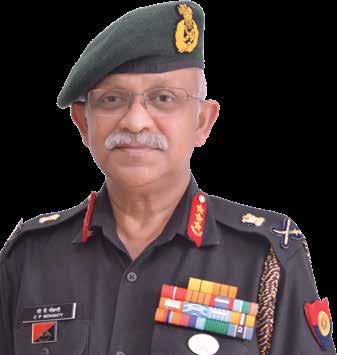IN CONVERSATION
GEOGRAPHY
MATTERS TO NATO As a geographically-aware organization, we have to be able to visualize things in all dimensions. The knowledge of where things are happening is very important to us and so data gathering and handling are crucial, says Air Chief Marshal Sir Stuart Peach GBE KCB DL, Chairman of NATO’s Military Committee.
T
he North Atlantic Treaty Organization (NATO) was formed in the aftermath of World War II as an intergovernmental alliance focussed on military defense within the Euro-Atlantic region. The Soviet Union, with the wider Warsaw Pact, was the main threat for decades, but after the Cold War it became evident that NATO could succeed more widely, such as the NATO-led International Security Assistance Force (ISAF) to Afghanistan following the 2001 Al Qaeda attack on the United States. NATO is now preparing its 2030 strategy to meet the everchanging global challenges, such as Russia’s destabilizing activities, the threat of terrorism, sophisticated cyberattacks, disruptive technologies, and China. NATO is governed by ministers from member nations through the North Atlantic Council. The highest military 8 | www.gwprime.geospatialworld.net | March-April 2021
authority in NATO is the Military Committee, comprising the professional heads of each nation’s defense staff. The Chair of the Military Committee works in NATO headquarters in Brussels alongside NATO’s Secretary General, Jens Stoltenberg. He advises the North Atlantic Council and Secretary General whilst also turning Council decisions into military direction to NATO’s military commanders. Air Chief Marshal Sir Stuart Peach GBE KCB DL has been Chairman of the Military Committee since 2018. He is the UK’s most senior military officer, having been elected Chairman of the Committee by his NATO peers after serving as the UK’s Chief of Defense Staff. Commissioned into the Royal Air Force in 1974, he initially flew Canberra aircraft in the photographic reconnaissance role. His illustrious career includes
many operational assignments, culminating in his first four-star appointment as the inaugural Commander of the UK Joint Forces Command in December 2011. Sir Stuart Peach is no stranger to geospatial intelligence and as the Chief of Defense Intelligence he helped develop international geospatial intelligence concepts and capabilities. In an exclusive interview with Geospatial World Contributing Editor, John Kedar, the veteran talks about NATO and its evolution, and the growing importance of geospatial intelligence.
What major security threats does NATO foresee in the coming years? The world is becoming uncertain and new



















